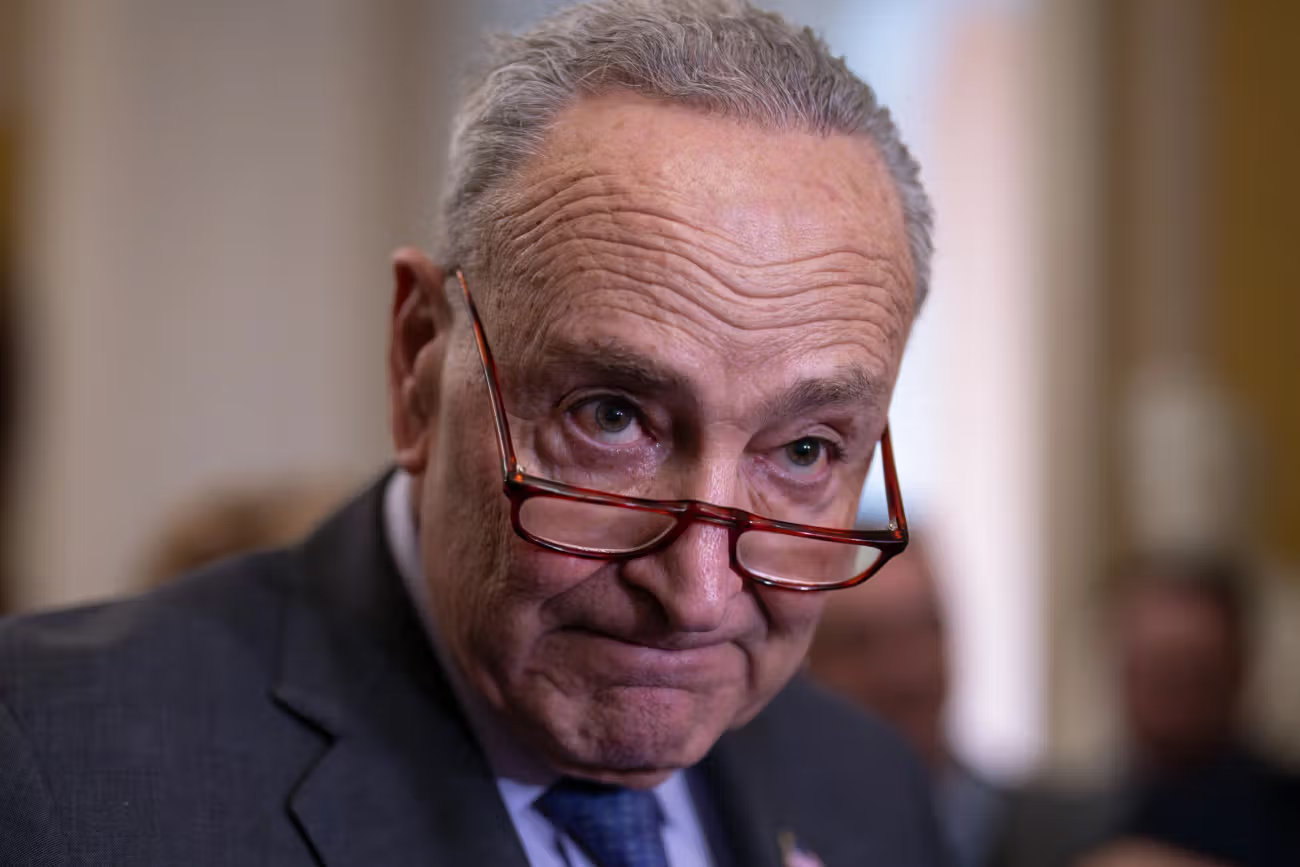President Donald Trump has sharply criticized Senate Minority Leader Chuck Schumer (D-NY) following the senator’s harsh remarks about Trump’s recent trip to Asia, describing Schumer’s comments as “almost treasonous” and accusing Democrats of undermining American diplomacy during a crucial moment for trade and national security.
The exchange marks one of the most heated moments in Washington amid an ongoing government shutdown that has stretched into its fourth week, as both parties trade blame for the political stalemate while the president pursues high-level negotiations overseas.
A War of Words Across Continents
As Trump’s plane departed South Korea late Thursday, he took to Truth Social to respond directly to Schumer’s speech on the Senate floor, where the New York Democrat mocked the president’s meetings with leaders in China, Japan, and South Korea.
“Worked really hard, 24/7, took in Trillions of Dollars and Chuck Schumer said trip was a ‘total dud,’ even though he knows it was a spectacular success,” Trump wrote. “Words like that are almost treasonous!!”
The president’s post came just hours after Schumer accused him of “gallivanting in Asia” while federal employees remained furloughed due to the prolonged government shutdown. Schumer claimed that Trump’s travel “sold out the American people” in pursuit of what he called “a photo op and a handshake.”
Schumer’s Critique: ‘Dancing in Malaysia’ and ‘Selling Out Workers’
From the Senate floor on Wednesday, Schumer delivered a fiery speech criticizing Trump’s diplomatic itinerary, focusing particularly on trade negotiations with China.
“He’s preparing now to meet with President Xi of China to strike a trade deal that will sell out the American people — giving away vital national security tools in exchange for little more than a photo op,” Schumer said.
The Democratic leader went further, mocking Trump’s stops in Southeast Asia as “gallivanting and dancing in Malaysia” while the shutdown crisis deepened at home.
Schumer’s remarks drew swift reaction from Republican senators, several of whom accused Democrats of deliberately blocking efforts to reopen the government for political leverage. The tension added fuel to an already divisive atmosphere as the shutdown entered its 29th day.
Trump’s Trip: Trade, Tariffs, and Global Strategy
During his weeklong Asia visit, President Trump met with key regional allies and economic partners, seeking to advance U.S. trade interests and reinforce security ties amid growing global competition.
Among the trip’s highlights was an agreement with South Korea that will bring an estimated $350 billion in new investment to the United States in exchange for reduced tariffs on key exports. The White House also touted new commitments from Tokyo and Seoul aimed at expanding technology cooperation and supply chain resilience.
In a closely watched meeting in Busan, Trump and Chinese President Xi Jinping held a 100-minute private discussion covering topics including tariffs, fentanyl trafficking, and rare earth exports — all longstanding flashpoints in U.S.-China relations.
“We have a deal,” Trump told reporters afterward. “Every year we’ll renegotiate the terms, but I believe it’ll go on for a long time.”
https://twitter.com/TrumpDailyPosts/status/1983704158428656118
The China Agreement: Tariff Reductions and Fentanyl Enforcement
Following the meeting, Trump announced his decision to reduce tariffs on Chinese imports by 10 percentage points — from 20% to 10% — in what he called “a show of good faith” after Beijing pledged to strengthen enforcement against fentanyl production and export.
“I believe he’s going to work very hard to stop the death that’s coming in,” Trump said, referring to Xi’s promise to crack down on the synthetic opioid trade.
However, senior administration officials later clarified that the effective tariff range would remain between 45% and 47%, as certain categories of goods were excluded from the reduction.
The two sides also reached a temporary agreement on rare earth mineral exports, with China agreeing to suspend planned restrictions for one year — a move welcomed by U.S. defense and technology industries that rely heavily on those materials.
A senior aide said the leaders plan to revisit the deal next year “with the goal of expanding cooperation while protecting American interests.”
Semiconductors and Strategic Technology
The Busan talks also touched on semiconductor supply chains, one of the most sensitive issues in U.S.-China relations. Trump confirmed that Xi had agreed to initiate talks with American chipmaker Nvidia about purchasing additional hardware, though he emphasized that “the discussions did not include the latest generation of processors used in advanced defense systems.”
According to Trump, maintaining “a balance between competition and cooperation” was essential to ensuring global stability while keeping American industries strong.
https://twitter.com/EricLDaugh/status/1983720255009538114
Schumer’s Allegation: ‘Selling Out America’
Schumer, in his Senate remarks, framed the president’s trip as a public relations effort intended to distract from domestic challenges.
“President Trump is about to congratulate himself, patting himself hard on the back for cleaning up a mess he created,” Schumer said. “This trip is a total dud, a waste of taxpayer dollars, and a distraction from the real work of reopening the government.”
Schumer accused Trump of “leveraging international deals for political optics” rather than focusing on what he called “the pain of American workers waiting for paychecks that never come.”
Republicans, however, countered that the minority leader’s comments undercut an active U.S. diplomatic mission.
“Criticizing the president while he’s negotiating with world leaders sends the wrong message,” said Sen. John Thune (R-SD). “The world is watching, and unity matters.”
Trump’s Response: ‘Schumer Should Be Helping, Not Hurting’
Trump’s response was characteristically blunt. In addition to his Truth Social post, he told reporters aboard Air Force One that Schumer “should be helping, not hurting” while the administration works to secure stronger trade terms for American workers.
“We’ve taken in trillions of dollars through tariffs, we’ve rebuilt jobs, and we’re respected again,” Trump said. “Schumer knows it was a great trip — he just can’t stand to see America winning.”
The president went on to accuse Democrats of “rooting for failure” to gain political advantage in the 2025 election cycle.
“They’re holding up government workers as hostages to score points,” he said. “It’s disgraceful.”
Reactions at Home and Abroad
Internationally, the Asia trip drew measured praise from business groups and analysts who viewed the U.S.-China discussions as a tentative step toward economic stability.
Chinese President Xi described his meeting with Trump as “warm” and “productive,” saying the two countries “should maintain dialogue even when differences arise.”
In the U.S., reaction fell along partisan lines. Supporters of Trump pointed to the new trade pledges as evidence of diplomatic success, while critics questioned the long-term value of the agreements.
Financial markets reacted positively, with Asian indexes rising modestly after reports of tariff relief and rare-earth cooperation.
A Clash of Leadership Styles
The clash between Trump and Schumer illustrates two competing visions of American leadership — one grounded in deal-making and direct negotiation, the other emphasizing oversight and restraint.
For Trump, foreign policy remains an arena for decisive action and visible results. For Schumer, it’s a stage where caution and institutional accountability take precedence.
Their latest exchange underscores how political conflict now extends far beyond Capitol Hill — reaching into the very heart of America’s global posture.
Conclusion
As President Trump returns from Asia, the political debate at home shows no signs of cooling. The president’s supporters see a leader advancing U.S. interests abroad; his critics view a commander-in-chief distracted from domestic responsibilities.
Whether Schumer’s remarks were “almost treasonous,” as Trump charged, will likely depend on where one sits in the country’s increasingly polarized landscape.
But one thing remains clear: even as the government shutdown drags on, Washington’s most powerful figures continue to wage their own battle — not just over policy, but over who defines what leadership looks like in 2025.

James Jenkins is a celebrated Pulitzer Prize-winning author whose work has reshaped the way readers think about social justice and human rights in America. Raised in Atlanta, Georgia, James grew up in a community that instilled in him both resilience and a strong sense of responsibility toward others. After studying political science and creative writing at Howard University, he worked as a journalist covering civil rights issues before dedicating himself fully to fiction. His novels are known for their sharp, empathetic portraits of marginalized communities and for weaving personal stories with broader political realities. Jenkins’s breakout novel, Shadows of Freedom, won national acclaim for its unflinching look at systemic inequality, while his more recent works explore themes of identity, resilience, and the fight for dignity in the face of oppression. Beyond his novels, James is an active public speaker, lecturing at universities and participating in nonprofit initiatives that support literacy and community empowerment. He believes that storytelling is a way to preserve history and inspire change. When not writing, James enjoys jazz music, mentoring young writers, and traveling with his family to explore cultures and stories around the world.









